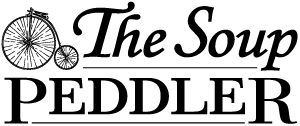Is There Magic In Food?
I've always thought a lot about food and what it means... how it carries messages between cultures and between people. Is there magic in food? How does it affect us so intimately? What do molecules and chemical reactions have to do with things and why does mom's food make you feel better than anything else? Why did people like my soup at first, when I really didn't know what I was doing? Did I imbue it with love? Is love transferable through matter, or is matter simply a placeholder and carrier of intentions? Are there love quarks that spin just so? Can you put them into food and have them received by the eater? Even further down that line of inquiry, perhaps a bit racier... are some foods aphrodisiac, or does the setting, the intention, the care, and the presentation make them so? And is it vital to cook with love? Why do we cook with love? I recently came across this passage from the highly recommended book Heat: "I suspect that cooking with love is an inversion of a different principle: cooking to be loved." Most of us don't really get the chance to witness and know chefs... just like any profession, there are varying motivations... I think of policemen as either pure public servants or those kids in high school who used to hang around wearing their varsity jackets too long after they graduated and finally decided to get a job where they could drive fast. With chefs, there are different types... the kind we have here at least are the kind that are driven by this desire to give and receive love, whether they'd admit it or not. We're generally isolated from chefs... most restaurants you never see them unless you happen to be wandering down the alley out back, hopping across the drainage oozing from the dumpsters. Thus the mystique, thus the Top Chef type shows on TV. There are plenty of livings to be made... being a chef is one of the toughest, so it's interesting to ponder what drives someone in that direction. I wrote two weeks ago about the uneasy mix of artisanship and management that so many restaurants have to balance, and there's a linguistic clue there, I think. Art has been defined by Random House as "the quality, production, expression, or realm, according to aesthetic principles, of what is beautiful, appealing, or of more than ordinary significance". This extraordinary significance is the difference... it's the icing on the cake of our existence. Cooking is a shared perceptual experience for both the cook and the eater. When you cook for your loved one, you are cooking for them, trying to please them, trying to make them love you, then sharing the same joy. For a chef, it's a little more abstract... it's the public, there's commerce involved... it's love for pay, a twist on an older profession. The thing is, they never get to see you eat and enjoy, they're just painting their love all over the world, and it makes them a bit of the altruist. The school teacher never sees the ultimate manifestation of his work, the painter is separated from his works, etc.
I was discussing such matters with Pat Brown here at the shop on the heels of our conversation about this fellow he once met. This guy was a retired doctor who decided to make it his mission to airdrop breadmaking kits across the world to reproduce Essene bread, which is the biblical recipe for the original staff of life. He was looking for a hand-cranked grain mill which could conduct the user's kinetic life force into the grain, a specially- shaped flagon for water which would align its properties just so. The powers of thought and love that went into the making of the bread would be conveyed and healing powers would be harvested by the recipient. The world would be a better place.
I don't really know about all that. It has a beauty to it, the kind of utopic thought that I take pleasure in imagining but ultimately can't wrap my mind around. Another memory popped forward... I used to rent the kitchen to a couple of guys with pure intentions who made energy bars. They wrapped each one in a corn husk and said a prayer over each one. They organized the room's energy with a large resonating bowl. But lately I'm more the pragmatist. I believe the greatest benefit from our food, the greatest flavor enhancer (besides salt) comes from the sense of caring and security that the gesture of loving cooking and sharing brings. I don't think anyone who didn't know of their prayers and their care could really gain from it. And I don't know that the molecules have so much to do with it either. Of course, no amount of love in the world can overcome the battered molecular structure of a burnt roux for example, but you get the picture. You still have to be a decent cook.
